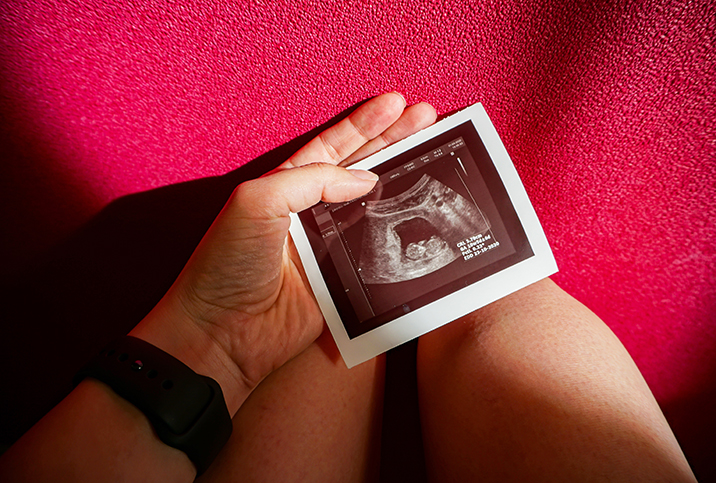Could Stress Have Caused Meghan Markle's Miscarriage?

It was an otherwise ordinary July morning in 2020 when Meghan Markle experienced a miscarriage. The Duchess of Sussex wrote about the experience in an opinion piece for the New York Times, describing a "sharp cramp" and a general "sense that something was not right."
In the new Netflix docuseries "Harry & Meghan," released Dec. 8, Meghan and her husband, Prince Harry, speculated the miscarriage was caused by stress. Discussing the experience, Prince Harry described the emotional turmoil of the ongoing court battle over a story in the British newspaper Mail on Sunday—published by Associated Newspapers Limited—that he believes contributed to the pregnancy loss.
"I believe my wife suffered a miscarriage because of what the Mail did," Harry said. "I watched the whole thing."
Harry referred to Meghan's long-running legal dispute with the Mail on Sunday, which began in 2019 when the popular tabloid published parts of a "personal and private" handwritten letter the duchess wrote to her dad after her wedding. Meghan won her privacy and copyright case against Associated Newspapers in 2021.
In the docuseries, the couple's lawyer, Jenny Afia, confirmed that Meghan's pursuit of legal recourse during pregnancy was emotionally and physically taxing.
"Meghan and I would be texting at 1 a.m. or 3 a.m. her time, she'd be awake, unable to sleep, thinking about this case and the wider issues and the toll it was taking," Afia explained in the documentary.
"Now, do we absolutely know that the miscarriage was caused, created by that?" Harry asked. "Of course, we don't, but bearing in mind the stress that that caused, the lack of sleep and the timing of the pregnancy, how many weeks in she was, I can say from what I saw, that miscarriage was caused by what they were trying to do to her."
What we know about miscarriages
Miscarriages occur when a pregnancy spontaneously ends before the 20th week of pregnancy. The experience is common, with an estimated 10 percent to 20 percent of pregnancies ending in miscarriage, according to Planned Parenthood.
Despite the ubiquitousness of the experience, the causes of miscarriages are not fully understood. It can be difficult to diagnose the cause of a miscarriage, however, experts generally agree that a miscarriage is rarely caused by something the pregnant mother did or didn't do.
"After a miscarriage, most people will ask themselves what caused it, why it happened," Ruth Bender Atik, a representative from the Miscarriage Association, told the BBC.
"Unfortunately, very few people will have an obvious cause diagnosed," Atik added. "In that situation, we tend to seek our own explanation, what we did or didn't do—and stress is one of those."
Regular activities such as work, exercise and sex do not cause miscarriages. The most common cause of miscarriage is a problem with genes or chromosomes, with an estimated 50 percent of miscarriages linked to an abnormal number of chromosomes. Typically, chromosomal abnormalities develop due to random errors during development and can't be prevented.
Other common causes of miscarriages include certain health conditions, including uterine and cervical anomalies, myomas, uncontrolled diabetes, infections, thyroid disease and extremes of weight, according to Kecia Gaither, M.D., a double-board-certified OB-GYN and director of perinatal services and maternal-fetal medicine at NYC Health + Hospitals/Lincoln in the Bronx, New York.
Drug and alcohol use has also been linked to miscarriage, she noted.
Miscarriages and stress overload
When evaluating the role of stress in miscarriages, there is conflicting information. One systematic review of prior studies indicated the risk of miscarriage can be significantly higher in women with a history of exposure to stress. Researchers weren't clear on the connection but speculated stress may interfere with important pregnancy hormones.
The study authors noted the limitations of existing studies, as they relied on retrospective reports, which tend to be "especially vulnerable to recall bias."
Most experts and major health organizations—including the World Health Organization (WHO) and March of Dimes—agree stress on its own is unlikely to cause pregnancy loss.
"There is no direct etiologic factor linking stress with miscarriage," Gaither said. "However, stress might be a causal co-factor."
In some cases, stress can lead to health complications, such as a vulnerable immune system or high blood pressure. In addition, coping with stress through activities such as unhealthy eating, smoking or drinking can increase the risk of miscarriage.
Since we have little influence over the stress in our lives, Gaither recommended pregnant people focus on aspects they can control.
"In the preconceptual period, have a visit with your health provider to optimize any comorbid conditions," Gaither said. "If recurrent losses have occurred, evaluation for chromosomal abnormalities in the parents by a geneticist is crucial. An evaluation for autoimmune phenomena should also be completed, along with an assessment for diabetes and thyroid disease.
"Taking folic acid, along with a prenatal vitamin and iron, in the preconceptual period is helpful to boost iron stores and decrease the risk of CNS [central nervous system] defects," she added.


















